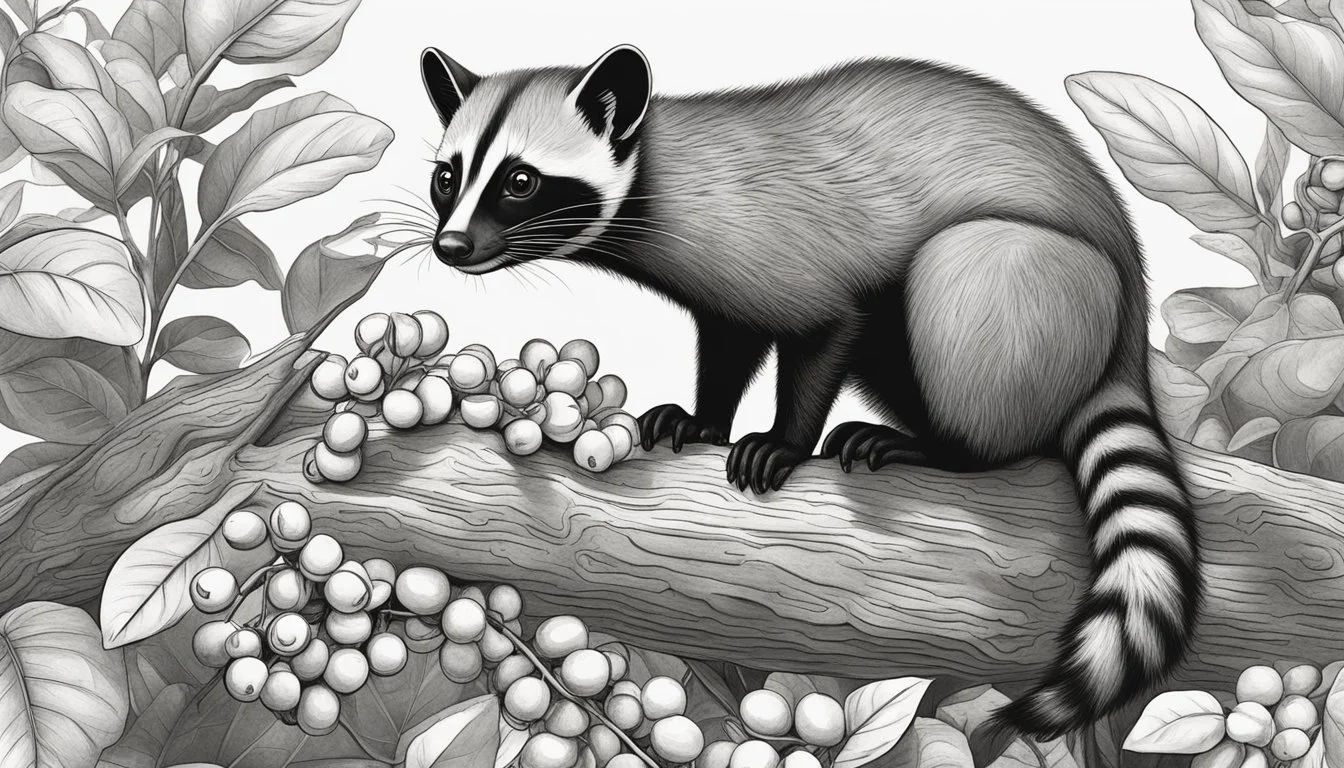Kopi Luwak
Unpacking the Debate Around Civet-Processed Coffee
Kopi Luwak, often referred to as civet coffee, is one of the world's most expensive coffees, with prices ranging from $90 to $650 per pound. Its unique production process, which involves the Asian palm civet, contributes to its high cost and distinct flavor profile. The coffee is made from cherries that have been eaten, partially digested, and then excreted by the civet. Enzymes in the civet's digestive system are believed to alter the structure of the coffee beans, resulting in a product that is less acidic and smooth in taste.
The demand for Kopi Luwak has led to a niche market that values it for its rarity and unconventional methodology. As a luxury item, a single cup can sometimes sell for up to $100, reflecting not just the properties of the coffee itself, but also the labor-intensive nature of its production. Traditional methods of gathering beans from the wild excretions of civets are being supplemented by more intensive farming practices due to the growing market.
However, the production of Kopi Luwak is steeped in controversy. The increased demand has significant ethical and environmental implications, specifically regarding the treatment of civets. While the coffee has a history of being collected from wild civets' natural defecation, the rise in popularity has led to the capture and caging of these animals to produce the coffee at scale, raising serious concerns about animal welfare in the Kopi Luwak industry. The debates surrounding this luxury coffee touch on larger discussions of ethical consumerism and sustainable agriculture.
What Is Kopi Luwak?
Kopi Luwak, often referred to as civet coffee, denotes a rare form of coffee bean production involving a particular Asian mammal. This coffee is renowned not just for its distinctive flavor profile but also for the unconventional method through which it is produced.
The Unique Process of Production
The production of Kopi Luwak begins with the Asian palm civet, which consumes ripe coffee cherries for their fleshy pulp. Inside the civet’s digestive tract, the cherries undergo a natural fermentation process. During this period, digestive enzymes and gastric juices act on the beans, altering their structure and flavor. These changes are attributed to the enzymes found in the civet's digestive system, which germinate - triggering a process that reduces the beans' bitterness and imparts a unique taste. The civet later expels the beans in its feces, after which they are meticulously collected, cleaned, and roasted to create the final product.
The Role of the Asian Palm Civet
The Asian palm civet plays a crucial role in the creation of Kopi Luwak. It is their unique digestive process that distinguishes this coffee from all others. The civet selectively feeds on the ripest and highest quality cherries, and it is believed that the combination of their selective habits and the beans’ journey through the civet’s digestive tract results in a coffee with reduced bitterness and enhanced flavor complexity.
Origins and History
Kopi Luwak, a coffee with its roots in Indonesia, has a complex history that intertwines its unique production process with colonial influence. This section explores how it evolved from a local oddity to an internationally recognized—and often controversial—luxury item.
From Indonesian Origin to Global Fame
Indonesia is the birthplace of Kopi Luwak, a distinctive coffee produced using beans digested by the Asian palm civet. Indigenous Indonesians discovered that wild civets consumed the coffee cherries but left the beans undigested, leading to their collection and eventual brewing.
The allure of Kopi Luwak began in the archipelago's tropical forests, where the civet's natural process of eating and digesting coffee cherries presented a unique fermentation that was found to affect the beans' flavor. As word spread, this Indonesian curiosity gained global recognition, bolstering its status as a sought-after coffee variety. In the contemporary market, Kopi Luwak's rarity and uncommon production method contribute to its fame and high cost, although its production raises ethical concerns.
The Dutch Influence on Coffee Plantations
When the Dutch East India Company took control of Indonesia's coffee trade in the 18th century, Arabica coffee was introduced. The colonial Dutch coffee plantations in Sumatra and Java forced a change in the local coffee consumption. The Dutch prohibited indigenous workers from picking coffee cherries for their use, leading workers to seek alternative methods to enjoy coffee.
Consequently, Indonesian people turned to the undigested beans found in civet excrement as a loophole, and thus, the tradition of making Kopi Luwak began. Dutch interest in Indonesian coffee burgeoned, and the commercial cultivation and export of these beans to Europe intensified. These historical practices laid the groundwork for Kopi Luwak's eventual international emergence from the Indonesian archipelago to the global market.
Production and Harvesting
The production and harvesting of Kopi Luwak involve the peculiar process of civets consuming coffee cherries and expelling the beans in their feces, followed by meticulous collection and cleaning.
Wild vs. Caged Civet Production
Kopi Luwak is derived from the Indonesian words for coffee (kopi) and civet (luwak). There are two primary methods for producing Kopi Luwak: using beans sourced from wild civets and those from caged animals. Wild civet production involves the collection of coffee cherries eaten by free-roaming civets, typically on or near coffee plantations. This method is regarded by many as less intrusive and is often claimed to produce a better flavor due to the natural selection of cherries by the civets.
In contrast, caged civet production sees civets confined in small, often overcrowded enclosures, a condition comparable to battery cages, and fed a diet exclusively of coffee cherries. This practice has led to significant ethical concerns over animal welfare, as it is considered highly stressful and unnatural for the creatures. Furthermore, it is a response to increasing demand and is seen as a way to ensure a more consistent supply of Kopi Luwak.
Harvesting Practices and Challenges
The harvesting process of Kopi Luwak is labor-intensive, requiring careful sorting and cleaning of the beans. After civets defecate the partially digested cherries, local farmers or harvesters must gather the feces. The layers of dung are then removed to extract the beans, which are subsequently washed, dried, and roasted to produce the final coffee. It must be noted that harvesters face several challenges, such as distinguishing between wild-sourced and caged civet beans and ensuring the cleanliness and safety of the product. Moreover, the labor is often intense and meticulous, with a need for precision to maintain quality.
The unique production and harvesting methods of Kopi Luwak contribute to its high price and controversial status, stirring debate between coffee connoisseurs and animal rights activists.
Ethical and Animal Welfare Issues
Kopi Luwak production has raised significant ethical and animal welfare concerns due to the caging and treatment of civets. These issues are central to the debates about the viability and morality of this coffee's production.
The Impact of Caging on Civets
Civets, when caged, suffer from a lack of freedom to exhibit natural behaviors, leading to psychological stress and physical health problems. Animal welfare advocates point to evidence of cramped, unhygienic conditions that often result in malnutrition and diseases. Captivity disrupts the natural diet and foraging patterns of wild civets, contrasting sharply with their life in the wild where they roam freely and have a varied diet.
Activism and Animal Welfare Initiatives
Organizations such as PETA (People for the Ethical Treatment of Animals) have been vocal in highlighting the animal cruelty in civet coffee production. They campaign against the use of caged civets for Kopi Luwak, advocating for adherence to basic animal welfare requirements. There have been initiatives pushing for certifiable ethical coffee production, which includes regular checks to ensure civets are not harmed and that any civet coffee on the market comes from wild civets under natural conditions. Despite these efforts, ethical concerns remain about the exploitation of civets in the industry.
Economic and Market Factors
Kopi Luwak's market dynamics are chiefly determined by its rarity and the intricacies of its production. Price points and demand reflect this coffee's status as a luxurious commodity, while concerns over authenticity and ethical sourcing shape certification processes.
Demand and Price Trends
Kopi Luwak is often nicknamed "the world’s most expensive coffee" due to its unique production process involving the Asian palm civet. This coffee's scarcity and labor-intensive collection contribute to its high cost. It's not uncommon for prices to range from $90 to $650 per pound. The demand for Kopi Luwak has remained high amongst connoisseurs despite ethical concerns, translating into a robust market. Recent market analyses have projected that the Kopi Luwak industry, valued at $6.5 billion in 2021, could increase to $10 billion by 2030. This surge is expected primarily in Indonesia and other coffee markets valuing rarity and distinctive production methods.
Counterfeit Kopi Luwak and Certification
The high price and demand for authentic Kopi Luwak have led to the emergence of counterfeit products in the market. To protect consumers and ensure quality, certifications for authenticity and ethical sourcing have become increasingly important. Various certification bodies assess whether the coffee is genuinely sourced from civet excretion and whether the civets are treated ethically. These certifications are essential in maintaining the coffee's quality, securing its high price, and fostering trust with consumers seeking genuine, ethically sourced Kopi Luwak.
The Coffee Plant and Cultivation
Kopi Luwak originates from a unique process where the coffee beans are harvested after being digested by Asian palm civets. This section explores the coffee plants' varieties and the cultivation techniques employed to produce these beans.
Coffee Varieties and Plant Characteristics
Arabica and Robusta are the two primary coffee plant species used for Kopi Luwak. Arabica plants thrive in high altitudes and tend to have a sweeter, more aromatic flavor, while Robusta plants, which have a stronger and more bitter taste, are more resilient and can grow at lower altitudes. Kopi Luwak primarily uses Arabica beans due to their higher quality and flavor profile, which is significantly altered by the civet's digestive process.
Characteristics of Arabica Coffee Plants:
They typically grow between 2.5 to 4.5 meters in height.
Arabica beans are oval with a prominent crease.
Prefer a temperature range of 15-24°C (59-75°F).
Robusta Coffee Plants:
Robusta plants are hardier and can reach up to 6 meters.
They possess a higher caffeine content.
Can withstand hotter, more humid climates and lower altitudes.
Cultivation Techniques in Different Regions
In Southeast Asia, specifically countries like Indonesia, which includes regions like Sumatra and Java, coffee plantation techniques vary. Coffee plants are generally cultivated in volcanic soil, which is rich in nutrients and retains moisture well. Shade-grown techniques are often employed to protect the coffee plants from direct sunlight and maintain the habitat's biodiversity.
Key Cultivation Methods:
Shade Grown: In Sumatra, coffee is often grown under the canopy of taller trees. This mimics the coffee plants' natural environment, reducing the need for chemical inputs and preserving ecological balance.
Sun Cultivation: Meanwhile, in Java, a more modern approach might be used, where coffee plants are grown in direct sunlight to increase yield, although this method may require more fertilizers and pesticides.
Both cultivation methods endeavor to cater to the finicky nature of the coffee plants, ensuring the optimal balance of shade, moisture, and nutrients for the Arabica coffee variety, used in the production of Kopi Luwak.
Taste Profile and Consumer Experience
Consumers often seek Kopi Luwak for its reputed smooth flavor and unique history. This specialty coffee's taste profile is as intriguing as its production method.
Describing the Aroma and Flavor
Kopi Luwak coffee is often described by consumers as having a smooth and rich taste with hints of chocolate and a syrupy texture. The aroma is uniquely compelling, combining elements of chocolate, caramel, and a slight floral scent, attributed to the fermentation process during digestion by the civet. The 'smooth flavor' is a defining characteristic that differentiates it from other gourmet coffees.
Aroma: Chocolate, Floral, Caramel
Flavor: Smooth, Chocolate, Syrupy
Professional Tasting and Reviews
Professional coffee tasters, such as those affiliated with the Specialty Coffee Association of America, have conducted tastings of Kopi Luwak. Their assessments often focus on the balance and cleanliness of the cup, the coffee taste, and the aftertaste. The caffeine content, while inherent in any coffee, is less frequently discussed in professional reviews but is not significantly different from that of other coffee varieties.
Balance: Kopi Luwak is noted for its lack of bitterness, credited to the civet's enzymatic fermentation.
Cleanliness of the cup: Despite its unorthodox production, tasters remark on its clean flavor profile.
Aftertaste: A lingering sweetness and smoothness are highlighted in professional reviews.
Sustainability and Conservation
Kopi Luwak coffee production raises critical sustainability and conservation issues, particularly concerning farming practices and the impact on wild civet populations.
Sustainable Farming Practices
Sustainable practice in Kopi Luwak production is essential to mitigate adverse environmental impacts. Some farmers in Bali have adopted methods that do not harm civets or the environment. This includes ensuring that civets are fed a varied diet and are not solely dependent on coffee cherries, promoting both animal welfare and biodiversity. Moreover, sustainable farming practices involve:
Shade-grown coffee plants that provide habitat for civets and other wildlife.
Organic farming techniques to avoid pesticides that could harm civets.
Ensuring the coffee cherries come from farms practicing good land stewardship.
Conservation of Wild Civet Populations
The conservation of wild civet populations is a pressing issue due to the demand for wild civet coffee. Ethical sourcing is paramount to protect these animals from being captured and exploited. Critical points include:
Supporting coffee producers who certify that their beans are from wild-sourced civets living freely.
Advocating for conservation laws that protect civet habitats from deforestation and poaching.
Educating consumers on the importance of purchasing coffee that does not harm civet populations.
By focusing on the sustainability of production and the preservation of civets, it's possible to enjoy Kopi Luwak coffee responsibly and ethically.
Cultural Impact and Popularity
Kopi Luwak's complex production process and distinct taste have contributed to its high cultural value and widespread interest across a variety of platforms.
Kopi Luwak in Media and Entertainment
Kopi Luwak has captured the fascination of audiences globally, prominently featuring in films such as "The Bucket List," where actor Jack Nicholson's character endorses the rare coffee. Its appearance in media has bolstered its reputation as a luxury beverage, despite the ethical controversies surrounding its production. Indonesian coffee, known for its quality, has often been associated with this particular type and portrayed as a cultural hallmark of Indonesia.
Global Perception and the Coffee Hype
The coffee's notoriety has spread beyond Indonesia, with coffee enthusiasts and curious consumers around the world seeking it out. Bali, a notable region of production, has seen a surge in interest from tourists wanting to experience the costly beverage first-hand. Despite the hype, critics raise concerns regarding the ethical treatment of civets and the authenticity of the product, as “wild” Kopi Luwak may often be misrepresented. Certain companies like Volcanica Coffee offer what they claim to be ethically-sourced Kopi Luwak, contributing to the product's complex global perception. The malting process unique to Kopi Luwak’s production is believed by some to impart a distinct quality to the coffee, adding to its allure and contentious status.
Health Considerations and Safety
When considering Kopi Luwak, consumers often weigh its unique origins against potential health considerations. The section delves into the nutritional content provided by this coffee and outlines the safety regulations in place designed to protect consumer health.
Nutritional Content and Health Benefits
Kopi Luwak, like all coffee, contains caffeine which can have stimulating effects on the human body's central nervous system. The digestive tract of the Asian palm civet supposedly imparts a unique profile of flavors and may alter the coffee's composite acids, potentially making it less bitter. However, no significant research, including studies by Food Research International or similar bodies, confirms any additional health benefits unique to Kopi Luwak over conventional coffee varieties.
Caffeine Content: Similar to regular coffee
Unique Properties: None scientifically proven
Safety Regulations and Consumer Health
Strict regulations govern the production and sale of Kopi Luwak to ensure it is safe for human consumption. These regulations ensure that the coffee beans are thoroughly cleaned and processed after collection from civet feces to eradicate any potential contaminants. Producers and distributors must comply with food safety standards similar to those applied to traditional coffee.
Sanitization: Beans are washed and roasted at high temperatures.
Regulatory Compliance: Producers must follow health codes and practices.
It's crucial that Kopi Luwak adheres to these standards to reduce risks to consumer health, ensuring that any bacteria or parasites from the civet's digestive system are eliminated through the proper processing methods.






